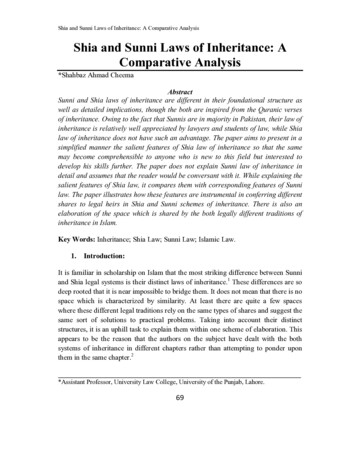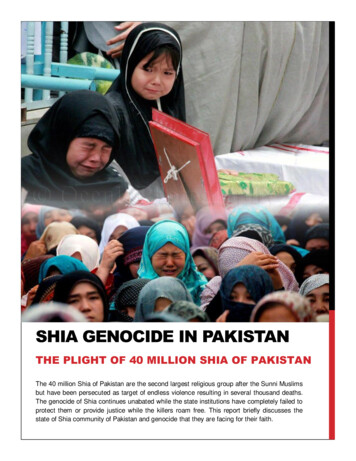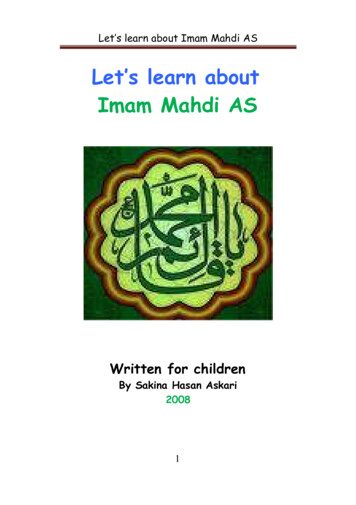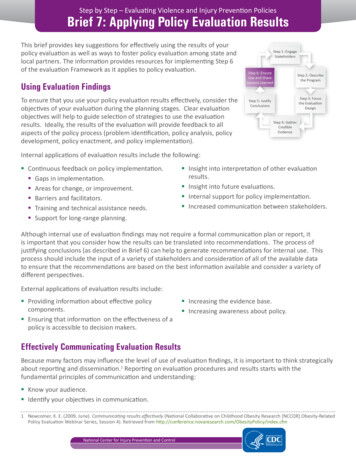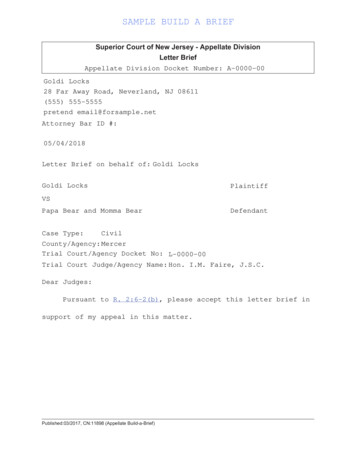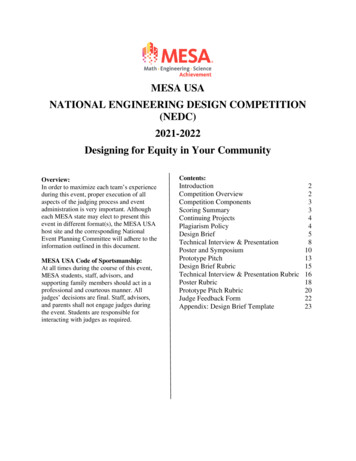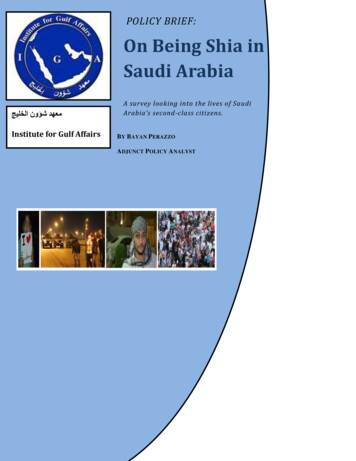
Transcription
POLICY BRIEF:On Being Shia inSaudi Arabia معهد شؤون الخليج Institute for Gulf AffairsA survey looking into the lives of SaudiArabia’s second-class citizens.BY BAYAN P ERAZZOADJUNCT P OLICY ANALYST
On Being Shia in Saudi ArabiaBayan PerazzoIntroduction:One does not need to search very intently to find that the Shia of SaudiArabia have been classified - through the social, political and religious spheres- as second-class citizens. The Shia minority, largely concentrated in theEastern province, are estimated to make up around 5-7 percent of the SaudiArabian Population. The vast majority of the Kingdom’s citizens are SunniMuslims; many of whom adhere to the rigid Wahhabi ideology, which inprinciple is extremely anti-Shia.The general contempt of Shias in the Kingdom is by no means a hiddenphenomenon. Religious publications under the government, school materials,and many of the Saudi government Clerics are very outspoken about theirdisdain for Shias. One prominent cleric in Saudi Arabia – Mohammed Al Arifidelivered a speech stating “Today the evil Shias continue to set traps, forMonotheism and for the Sunnis”, he continues in this same speech to claim allShia loyalty is to Iran and that Shias wish to do violence against Sunnis“because their name was Omar or Aisha”, and that they would “skin Sunnisand boil them in water.” The homogenization of Shias reflected in these claimswould seem outrageous to an academic or anyone with experience interactingwith Shias. However, many Saudis believe this discourse and have been
indoctrinated with a deep hate for Shiism, although the majority have little tono interaction with Shias.It is no surprise that the Shia minority in Saudi Arabia took to thestreets in 2011 and 2012 following the uprisings in Tunisia and Egypt. It is notthe first time that they have demonstrated and demanded their rights. Anuprising following the 1979 Iranian revolution inspired many Shias to demandthey be treated equitably. However, these uprisings have always resulted inbrutality and bloodshed for the Shias and statements from the Saudi ministryof Interior justifying their harsh actions by shifting the blame to thedemonstrators.In order for there to be an understanding between Shia and Sunni inSaudi Arabia, the Shia minority’s concerns and voices must be heard. At thepoint in time, Saudi Arabian Shias are not given a voice to representthemselves. They are ultimately represented by corrupt clerics with ulteriorpolitical motives – leaving the Saudi public confused and misguided in regardsto the Shia doctrine and the population of Shias within the country.The aim of this project was to voice the concerns of the Shias in SaudiArabia. I began interviewing from inside the Kingdom in 2011, shortly after theprotests in Qatif had begun. Due to the sensitivity of the subject and securityrisks, the majority of the people who I have interviewed have entrusted me tokeep their identities concealed. It was very difficult to get people to agree to sitdown for an interview, as many Shias are afraid to speak out about their
situation. They are mindful of the repercussions that may be exacted againstthem by the Saudi government. Many people whom I approached absolutelyrefused to answer questions. This reaction in itself was a good indication of thereality of their situation – many Shias do not feel free or safe enough to speakout in their own homeland.Of the 22 people interviewed, the average age of the interviewee was 31.5years old; the youngest being 21 years old and the oldest being 61 years old.The majority were male professionals, though seven of the interviewees wereSaudi women. The majority came from Qatif, then Dammam, Hassa, Khobarand Saihat; all of which are cities in the Eastern province.The interview consists of seventeen questions; some are yes or noquestions while the majority of them require elaboration. To all of thequestions, there were extremely similar responses - showing a sharedperception of general discrimination of Shias in Saudi Arabia. The respondentsexpressed a strong desire for positive change; to be heard and understood. Iwill go through each question and explain the general theme of the responses,and share statements from the interviewees that help elaborate or capture theirsentiments.Question One:The first issue addressed in the survey was equality in the jobs spherebetween Shias and Sunnis. In question one, the interviewees were asked; “Doyou feel there is equality between Sunnis and Shias in Saudi Arabia in
Job opportunity? If no, explain.” To this question, 100 percent of therespondents replied no. There seemed to be no disagreement among theinterviewees that access to jobs and promotions was much easier for Sunnis,and that Shias were often the victims of discriminatory actions in theworkplace.Those who elaborated on their response mentioned that Shias were notallowed key positions in the government, major companies or the military.Some pointed out that there has never been a Shia minister. A number ofinterviewees mentioned that in the Shia-dominated Eastern provinces’ femaleschool branches, there has not been a single Shia school principle. Manymentioned that even though a Shia may be better qualified than their Sunnicolleagues, their salary would be significantly lower; some arguing that theinitial salary offer is lower for a Shia than a Sunni.One man told his story of working as an IT Professor training his Sunnicolleagues. He was asked to train a Sunni co-worker who was less qualifiedthan him and in a lower position at work, but who had a salary five timeshigher than his own1. Another man from Qatif told his story of being forced toretire early from Saudi Aramco right as he was due for a promotion to a veryhigh position. When the man was retired, the position was offered to a Sunniman who had been in a position below him.212Interview # 4 – Question OneInterview # 9 – Question One
There is no doubt that the sentiment among Saudi Shias is that they donot have fair access to job opportunities. The respondents reached 100 percentconsensus in their beliefs that Saudi Sunnis were given favor in the jobsmarket.Question Two:The Second issue addressed attempted to see if the most intimate form ofsocial amalgamation – marriage- was acceptable between Sunni and Shiafamilies. The question was “Are marriages between Sunni and Shiacommon practice in Saudi Arabia (or are they socially acceptable)?” 100percent of the people interviewed said that Shia-Sunni matrimony isconsidered socially unacceptable; though a small number did mention thatbefore sectarian tensions arose, intermarriage was a more common practice incertain cities.Those respondents who mentioned that they did know of people who hadinter-married, all had stories of unhappy endings. Two men from Qatif saidthey had heard of a marriage which came to an end when the “governmentforced them to divorce”3. One woman from Saihat says:“I have a friend who married a Sunni man from Riyadh After theywere married he wouldn’t let her go to visit her family, and theyhad a child but he taught the child bad things about Shias. Theygot a divorce Most of the stories we hear are like this.”434Interview #4 & #5, Question #2Interview #10, Question #2
The responses indicated that intermarriage was most common or accepted inAl-Hassa, which could be due to the fact that this is the Shia majority city withthe largest Sunni minority. The most optimistic of all responses comes from a28 year old man from Qatif:“I personally know at least a dozen people, Shia women & men,married to Sunnis from Saudi or mostly from other Arab countries.In Al Hassa, it’s also common in many villages that Shias marrySunnis, or at least was until Sectarian tension rose. Many familiesand clans in Al Hassa have Sunni and Shia branches, andsometimes in the same household.”5Part of this phenomenon could be understood through the fact that manySaudi clerics have declared it is forbidden for Sunnis to take Shias as marriagepartners. In a religious pamphlet published by the Saudi government forinstruction on the Islamic principles of Marriage it states:“Forbidden to you in marriage are Hindus, Buddhists, Polytheists,atheists, and Shias”6Another Saudi cleric was asked on his webpage if it was permissible to marry aShia. This was the clerics Fatwa:“The Rejecters7 call the Sunni infidels (as it is said in their famousbooks) and do not pray with them; hence Sunni consider theminfidels because they object the Quran and call the greatestcompanions infidels, and reject their Hadith in their two trusted5Interview #14, Question # 2Islam and Marriage, p. 137 This is a vulgar term that Al Wahhab used to refer to the Shiites, it is used to this day indiscriminatory manners towards Shiites.6
books, and they worship Ali Ibn Abu Talib and Hasan andHussein, and Zein Alabedeen, and call them Lord Hence theirslaughters and fornicating with their women is forbidden.”8The responses in regards to marriage show that Shia and Sunnimarriages are not common practice and are not typically considered sociallyacceptable. The discourse of Sunni clerics even claims that it is forbidden inIslam for Sunnis to take Shias as spouses, making it a religious sin to wed aShia. However, in the case of the Shias it seems that marriage to a Sunni ismerely a social stigma; something that is culturally shunned but does not havea religious basis.Question Three:The third issue addressed was equality in public services of Shia majoritycities to similar-sized Sunni majority cities. The question was “Do you feelthat quality of public services in Shia majority cities are different thanin similar sized cities with Sunni Majorities? If so, how?” Regarding thisissue, 20 out of the 22 respondents – or 90 percent believe that the services areunequal, leaving Shia majority cities with inadequate or even non-existentpublic services. Nearly every interviewee mentioned that there are no existinguniversities for men or women in any of the Shia majority cities, while smallSunni majority villages have had a number of campuses opened in recentyears.8http://ibn-jebreen.com/?t fatwa&view vmasal&subid 8748, April 2010; Translation from SharafAl-Hourani, Time Magazine, Cairo.
One respondent, a self-described activist from Qatif explained that hewent with a group to ask government authorities to build a university for themso their children wouldn’t have to travel out of town for higher education. Inresponse, the government authorities recommended that they simply attendthe university of Dammam (Dammam is considered a city with a Sunnimajority). Despite the fact that Shias are a very well-educated group, especiallyin regards to the rest of the Saudi Arabian population, there are no universitiesin their population centers. Some interviewees mentioned that Shias from theEastern province are well known for being well educated, especially in themedical and engineering fields.9 One Qatifi man mentioned:“There are no universities in Qatif, while there are towns with less1/5th of its size that have universities.”10One of the two interviewees who responded that services were equal (though hebelieved them to be equally poor) mentioned some exceptions to this equality.The 29 year-old man from Dammam says:“There are infrastructure and public service problems (severe onessometimes) but they are not limited to Shia areas. Look at Jeddahfor example. It is the second largest city, mainly Sunni, and lookwhat happened when floods attacked in 2009 due to badinfrastructure. One exception is the universities.”119Interviews 4 and 9Interview # 14, Question three11Interview #1, Question Three10
One Saudi engineer from Dammam also said that the services were equal(again, equally poor) but mentioned that mosques were the exception to theequality:“Yes they are equal but they are poor everywhere. For mosques, it’svery hard to get approval for Shia mosques and the governmentnever contributes for the payment in the building, and only Shiacan pay for these. Hospitals are terrible everywhere.”12The majority mentioned that there are major discriminatory policies in place forShias who try to build mosques. For example one 29 year-old Qatifi ComputerTeacher mentions:“Shia residents face discrimination in building newmosques Unlike the other provinces, the Islamic Affairs Ministry(Awkaf) does not build mosques in Qatif; building permits are alsonot issued, thus obliging residents to either build them illegally ashouses, or renovate old mosques and Hussayniyat, some of whichare over a century old and thus incompatible with contemporarydemographic increases.”13It appears that this is true; in a confidential document from the US consulatein Dhahran in Saudi Arabia, the consul General Kevin Kreutner wrote in 2009:“ Sunni Mosques are generally funded and operated by theMinistry of Endowments (Wizarat al Awqaaf), and the approvalprocess to build these mosques is straightforward. Sadek jokedthat “if just one Sunni complains that he must travel too far toattend mosque the government will approve and fund a new1213Interview #11, Question ThreeInterview #6 – Question Three
mosque tomorrow According to several contacts, building a Shiamosque in Al-Ahsa is very challenging. In 1998, the Saudiauthorities announced new licensing requirements for Shiamosques in al-Ahsa and have since closed 20 mosques. Many ofthese mosques were in operation for over a decade before beingclosed. The authorities often use tactics similar to what iscurrently being done in al-Khobar to force closures includingcutting off electricity to the mosques and threatening the arrest ofthe property owner.”14Another issue that was brought up by this question was quality ofhealthcare. Many people interviewed expressed that hospitals and clinics inShia-majority cities were not on par with those in Sunni-majority cities ofsimilar size. A 32-year old Qatifi man stated:“In Qatif the official numbers says there are about half millionpeople living in Qatif and it only has one central governmenthospital and a few health centers; on the other hand, a similar sizecounty has about 60-70 more hospitals.”15Another interviewee, a 29 year-old teacher from Qatif says:“In Qatif there is only one hospital, it’s 26 years old, with 360 bedscapacity for all types of patients, other Saudi cities have specializedhospitals.”16Another Qatifi man states:14Kreutner, Kevin, “Saudi Authorities Crack Down on Shia in Al Ahsa”, US Confidential Files, DharanConsulate 20091516Interview #4 – Question ThreeInterview #6
“For example, there’s a public hospital bed for every 1456 people inQatif; while the ration is half or even a quarter of that in othersimilar size cities.”17A woman from Al Hassa says:“Even though our cities have large populations and are oil rich, itseems like a poor country because of how bad the schools andhospitals quality is.”18Two of the women interviewed discussed an event last year where a man wasbrought into a hospital with a broken arm and was killed by malpractice on thepart of the doctors. They argued this was because of the poor quality of doctorsat Qatif’s hospital.19 A number of respondents from Saihat or Qatif said theydrove out of their cities into the Sunni majority cities to seek health care.20The sentiment of inequality seems to be strong among Shias in regards totheir cities public services. The overwhelming majority of those interviewed feltthat the government closing Shia Mosques, purposely refusing to openuniversities in the Shia majority cities, and not making an effort to improvehealth care in their areas were proof enough of discriminatory and unfairgovernment policies.Question Four17Interview #14Interview #1919Interviews #10 & #1220Interview #12 & 2118
The fourth question asked was for a general response; “How do you feelthat most Sunnis in Saudi Arabia view Shias?” 100 percent of thoseinterviewed wrote that the general perception of Shias in Saudi was negative.A 50 year old man from Qatif says:“There is a difference in opinion. However you will find that themajority doesn’t have much of an idea of what being Shia is. Theyare fed a lot of propaganda through the clerics and through smallDa’wa books that are published through the government, many ofwhich have very strong anti-Shia messages, and they are eveneducated by parents to be this way. I think some despise us, butmostly we are seen as second-class citizens in a way. Very few areopen to it – and most who are open in this way you will find havestudied overseas, or spent significant time outside the Kingdom.”21Another very common theme was that many Sunni viewed Shias as theirenemies, and believed that Shias were loyal to Iran.“The majority here are view us as infidels and traitors, fools whofollow the Iranian Government.”22“Most of them see us as enemies who are planning on somethingagainst them”23“The majority feel like we are coming from another country whichis Iran, so they deal with us as if we don’t have rights in ourcities.”2421Interview #9Interview #1123Interview #424Interview #722
Some of the responses made a difference between the views of Salafi/WahabiSunnis and liberals:“I’d say it’s a mix of different views that depend on many factors.But all in all, it’s a mix of distrust, hate, bigotry, ignorance on themost part, but there’s also tolerance, coexistence and cooperation.For example, Sunnis who historically lived around Shias alongwith those from Hijaz (Makka, Madina and Jeddah) usually havetolerant views. Also, liberals in general tend to get along with Shiasand don’t have a very hostile attitude towards Shias. However, themost hateful are the religious Salifis and those who have hostileviews to people outside their social, religious and tribal circles; andthey view Shias with implacable animosity that is fascist andgenocidal in nature in many instances.”25“Wahabi clerics say that Shias are not Muslims, but moderatesand liberals see them as a part of the country”26“Not all of them hate us, but I would say the majority do. I thinkthere is a lack of respect for Shias even though they don’t knowwhat we are or what we believe, they just hear lies, they believewhat they are told and they think we are bad. It is not their fault itis the fault of the Saudi system that teaches children from a youngage that nothing is more important than Saudis version of Islam(an interpretation unique to the Kingdom), and that Shias are theworst.”27Though some did differentiate between liberal and Salafi views of Shias, therewas general agreement by all of the interviewees that Shias are held incontempt in Saudi society.25Interview #14Interview #627Interview #2226
Question FiveThe fifth question asked was, “What do you think are some mythsthat Sunnis have about Shias?” The responses were very consistent in thissection, some which are very shocking. Among the myths that were mentioned,were comments that Shias are liars and hypocrites who are waiting to betraySunnis. In addition to this, Shias have secret plans to take over Sunniproperty, read from a different Quran, worship Ali (the cousin of Muhammad),worship Imams, secretly work for Iran, are mostly children born out of wedlock,that they killed Imam Hussein (the son of Ali), perform adultery on Ashura (theShia day of mourning), spit and pee in food that they serve to Sunnis, areactually secret Jews, that their belief was established by a non-Muslim, thatthey hate the Prophet, that they believe Ali was the Prophet and notMohammed, and that Shias have tails. Surprisingly, eight of those interviewedlisted ‘Shias have tails’ as a myth held by Sunnis about Shias in SaudiArabia.28One of the most common themes in this answer set was that the Shiaparticipate in some sort of sexually forbidden practices which were permittedby their beliefs:“That Shias are bastards.”29“Some of them think that Shias do prostitution (especially inMoharam) and it is legal.”302829Interviews #4, #5, #7, #9, #11, #17, #19, #21Interview # 1, #4
“That Shias commit adultery in order to have a baby.”31“Some say Shias have group sex on Ashura”32“Shias have orgies on Ashura, women engage in sex even with theirsiblings and fathers, and the end result is called “Sayyed”.Shias give their wives for Muta’a to Shia clerks. “Sons of Muta’a”, avery prevalent anti-Shia slur.”33As you can see a number of responses have something to do with myths ofsexual perversion within Shiism. Though the temporary marriage is notaccepted by all Shia schools, it is generally accepted among Twelver Shias. It’spracticed in Iran, but illegal in Saudi Arabia. Many of these sexually perversemyths appear to be a frustration for those who were interviewed. The loyalty toIran also seemed to be a frustration. Many mentioned they had never been toIran and felt no special connection to the country; some even denounced theIranian regime.Overall, the questions show that there are a large number ofmisunderstandings and myths about Shias in Saudi Arabia, many of thoseinterviewed blamed the government’s Islamic educational system. Theymentioned that school materials teach hateful propaganda about Shias,teaching kids from a young age that Shias are non-Muslims. Educators andclerics often convey inaccurate information about what Shias believe.30Interview #2Interview #532Interview #1133Interview # 14 and 1731
Question SixThe sixth issue addressed how comfortable Shias are with revealing theiridentity. Oppressed minorities in discriminatory environments will often choosenot to reveal religious identities. The sixth question was; “Do you, in certainsituations, choose not to reveal your Shia identity around Saudis inorder to avoid discrimination?” More than half of the respondents said yes,they do have to hide it at times for fear of discrimination. The other half of therespondents said said no. Still, when it came time to elaborate, all recognizedthat many Shias have to hide their identity in order to be taken seriously:“Generally, I don’t have to do that This is probably because I liveand work in areas that are either Shia areas or where Shias arefamiliar. Some Shias who work in remote areas with almost noother Shias have stated that they have to hide their identities fromother Sunnis because they feared discrimination”34“Although it’s hard because of my name and family name, I do mybest to hide it. Some people don’t care but from many I receiveunjust hate just because I am Shia.”35“Some people do, but I have never done it, I am proud that I amShia and I do not care if they like me or not.”36“In the past yes, I did but now I don’t do this because I want themto accept me as a part of the country.”3734Interview #1Interview #436Interview #537Interview #635
“I didn’t choose it, but in some situations I fear that some Sunniswill deal with me by discrimination, and it happened”38“It’s not something that I choose to hide. However, this is not thecase for most of us. In order to keep someone’s respect for us, it’sbetter to not say it. Many problems arise after people know.”39“I did most of my life because I wanted to feel respected by mypeople. But now, I don’t care, this is the time for a revolution of themind and we should stop being afraid of their hate and tell themwhat is true and right about Shiism, and we need to educate themso they will understand that we are all Muslims and brothers andSisters in Islam.”40Based on the responses, it appears that many Shias have to avoid allowingSunnis to know they are Shia in order to avoid discrimination and to earn theirrespect. The other respondents who said they chose not to conceal theiridentity for fear of discrimination recognized that it was still difficult for Shiasto reveal their identities. Others simply stated that they were proud to be Shiasand they did not care about reactions.Question SevenThe seventh issue addressed was discrimination on the individual level,the question asked; “Have you personally experienced discriminationbased on the fact that you are Shia?” 100 percent of the Shias interviewed38Interview #8Interview #940Interview #2239
had experienced some form of discrimination based on the fact that they wereShia. Every single respondent said yes without hesitation, revealing a difficultreality for the Shias of Saudi Arabia.There were three men who told stories of being kicked out of mosqueswhen they went to pray. Many Shias have some slight yet perceptibledifferences when praying, often making it easy to identify a Shia as they pray.One man from Qatif said while he was praying at a mosque in Riaydhsome men approached him after prayer time and told him never to come backto the mosque again.41 Another man from Dammam said that he was kickedout of the Mosque in Medina during Ramadan by a group who told him Medinawas for “Muslims only” thus “he wasn’t allowed to be there.”42A Saudi cleric named Abudllah Bin Abd Alrahman Al Gebreen was askedif Shias should be permitted to pray in Mosques. Al Gebreen declared a fatwastating that Shias should not be allowed to pray in Sunni mosques. He said:“You have to ask them about their prayers whether it’s correct orfalse, if they say its correct make them pray with you, if they sayit’s false ask them about the reason behind that, if they claimedyou are wrong and called your worship false then they havedeclared you an infidel, and he who calls a Muslim an infidel is aninfidel, so prevent them from praying because they are infidels inwhat they do and that is to call you infidels and calling yourprayers false, so they have no prayers nor worship if they prayed in4142Interview #5Interview #11
a way that conflicts with the prayers of the Muslims in theMuslims’ mosques. So prevent them so that they would go to theircountries and pray in their own worship houses, and may Godprotect us from their evil ways.”43A number of things are said in this fatwa. Beyond declaring that it is notallowed to let Shias pray in Sunni mosques, he also implies that Shias comefrom another country (possibly Iran) and should go there to pray. Lastly, hesays it conflicts with the prayers of the “Muslims” in “Muslim” mosques,implying that Sunnis are the Muslims, and Shias are not. Thus, it is notsurprising that a number of Shias would have experienced being kicked out ofmosques, as it appears this is what has been declared proper religious behaviorby powerful Saudi clerics.There were a number of other issues of discrimination that the Shiasaddressed in their interviews. One man from Qatif explained that he was tiredof automatically being associated with loyalty to Iran. He also mentioned thateven though his medical test scores were in the 95th percentile, he was notaccepted into a medical program, and not given a chance for an interview.Meanwhile the university accepted other Saudis with a much lower average.44Another man from Dammam said he felt the strongest form of discrimination43http://ibn-jebreen.com/?t fatwa&view vmasal&subid 7827, April 2012. Translation by Sharaf Al-Hourani, TimeMagazine, Cairo.44Interview #4
when watching Saudi media45. Other Shias give us their examples ofdiscrimination at the work place:“I was a lecturer at the Teachers College in Dammam in 2006 aftergraduating from there, and I succeeded in all tests and passed allpersonal interviews, they then asked me to sign acceptance papersand asked me not to accept any other job and the college listed myname as a lecturer for the next term. After they knew that I wasfrom Qatif they refused to complete my acceptance papers.”46“The strongest case was when I was at work, and it’s in fact why Idecided to finish with the company. Aramco was much better whenit was run by Americans, when Saudi took over the hierarchychanged very much. Though I was more productive and qualified,the position that I should have been promoted to was given to aperson with less experience, less qualifications, and lessproductivity but who was Sunni.”47“Yes, however, I felt discrimination the most when my father, whohad a Masters in Economics, was laid-off from his job and given apackage, while unqualified people were left to operate and lead thecompany. The lay-offs and forced retirement targeted all Shiasthen.”48Another Shia woman who was a university teacher in a rural Sunni majoritycity explains how she had to hide her identity at work. She would say her45Interview #1Interview #647Interview #948Interview #1446
prayers with her office door locked to make sure nobody would see her. Shealso states:“My students do not know I’m Shia because I’m from Dammam,but my origins are in Qatif. When I told some girls I went to Qatifduring a vacation they were disgusted and said don’t be with thosepeople they are bad people who are not Muslims.”49Another man from Qatif shared a story about a Shia teacher who had beenteaching at an exclusively Shia school in that city in 2010. He was fired fromhis position for teaching his Shia students the Shia way of praying.50Apart from employment discrimination, there were a number of storiesabout discrimination in their personal lives. One Saudi woman from Saihatsays she celebrated Ramadan with Sunni Saudi Arabian students who werestudying with her in the United States. These students did not know that sheor her two friends were Shia. When it came time to pray and break the fast,their prayer mannerisms revealed their identities as Shias. She went on to saythat the Sunnis whom they had been passing the first two weeks of Ramadanwith never called them back or invited them to do anything after that day. Shealso explained that there were other Saudi exchange students who would warnincoming Saudi exchange students not to talk or trust them because “theywere Shias.”Another woman who attended University in Dammam said she onceheard a friend of hers insulting Shias, and when this woman revealed her4950Interview #16Interview #13 – See additional comments at the end of Interview.
identity as a Shia, her friend put the
to the Shia doctrine and the population of Shias within the country. The aim of this project was to voice the concerns of the Shias in Saudi Arabia. I began interviewing from inside the Kingdom in 2011, shortly after the protests in Qatif had begun. Due to the sensitivity of the subject and security
